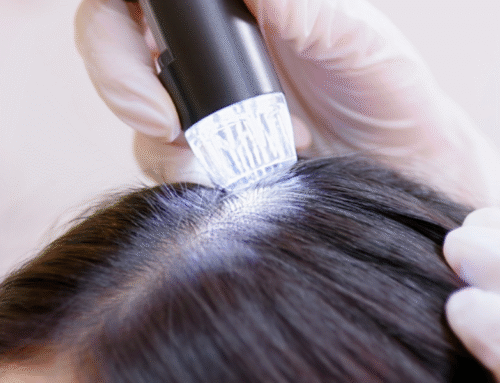What is Alopecia Areata?
Alopecia areata is an autoimmune condition that causes sudden hair loss in specific areas of the scalp or body. It affects both men and women and can appear at any age, although it most commonly develops before the age of 30.
Unlike other types of hair loss, alopecia areata is marked by smooth, round bald patches without visible redness or inflammation. The condition can vary in severity, from mild patchy hair loss to more advanced forms such as alopecia totalis (complete loss of scalp hair) or alopecia universalis (loss of all body hair).
Main Causes of Alopecia Areata
While the exact cause is not fully understood, it is known that the immune system mistakenly attacks hair follicles, leading to hair loss. Several factors can trigger or worsen the condition, including:
-
Genetic predisposition: More common when there is a family history of autoimmune diseases.
-
Intense physical or emotional stress: Often acts as a trigger for sudden hair loss.
-
Immune system imbalances: Associated with conditions like hypothyroidism, vitiligo, or lupus.
-
Environmental and hormonal factors: Some studies suggest viruses, hormonal changes, and toxins may contribute to flare-ups.
Symptoms of Alopecia Areata
The most common symptoms include:
-
Patchy hair loss: Circular or oval areas of varying sizes.
-
Exclamation mark hairs: Short, tapered hairs at the edges of bald patches.
-
Nail changes: In some cases, nails may become brittle or develop horizontal ridges.
-
Irregular regrowth: Some areas may regrow hair spontaneously, while others relapse.
It’s important to note that alopecia areata is not painful or itchy, and its progression is unpredictable—it may stop, reverse, or spread within weeks.
Effective Natural Treatments for Alopecia Areata
While there is no definitive cure, various natural and holistic treatments can help stimulate hair regrowth, strengthen follicles, and reduce scalp inflammation. These are some of the most effective therapies:
-
Personalized Herbal Hair Therapy
Phytotherapy uses plant-based extracts with anti-inflammatory, regenerative, and stimulating properties to awaken dormant follicles. Key ingredients include:
-
Rosemary: Enhances blood circulation to the scalp.
-
Saw palmetto: Blocks hormonal activity that can damage follicles.
-
Ginger and turmeric: Reduce local inflammation and promote cellular oxygenation.
-
Nettle: Rich in minerals, strengthens follicles from the root.
When combined in customized formulas, these extracts can be tailored to the specific causes of alopecia and boost hair regeneration.
-
Non-Invasive Topical Therapies
-
Essential oils such as lavender, peppermint, and Atlas cedar have shown promising results when massaged daily into affected areas.
-
Pure aloe vera: Soothes the skin and supports follicular regeneration.
-
Botanical hydrosols: Like sage or rosemary hydrosols, which balance a sensitive scalp and deliver key nutrients.
-
Targeted Nutrition and Supplementation
Hair needs specific micronutrients to grow strong and healthy. Some of the most recommended include:
-
Biotin (vitamin B7): Crucial for keratin synthesis.
-
Zinc and iron: Common deficiencies in those with hair loss.
-
Vitamin D3: Helps regulate immune response.
-
Omega-3 fatty acids: Natural anti-inflammatory properties.
A balanced diet rich in fruits, vegetables, lean proteins, and healthy fats plays a vital role in supporting hair recovery from within.
-
Stress Management
Since chronic stress can trigger or worsen alopecia areata, it’s essential to incorporate wellness practices such as:
-
Meditation and conscious breathing.
-
Regular physical activity.
-
Mind-body therapies like yoga, mindfulness, or acupuncture.
Lowering cortisol levels and improving emotional well-being can lead to noticeable improvements in hair health.
Is Recovery Possible?
Yes. In many cases, hair grows back spontaneously, especially if the episode is mild or recent. Still, a natural and personalized approach can speed up the process and help prevent future relapses.
The key lies in addressing the root causes, not just the visible symptoms, and using botanical formulas that work in harmony with your body—not against it.
Conclusion
Alopecia areata can be a difficult experience, but it’s not a permanent sentence. There are natural, safe, and evidence-based alternatives that offer new hope to those who want to restore their hair without harsh side effects. Herbal hair therapy, combined with proper nutrition and emotional well-being, is a powerful tool to restore scalp balance.
Would you like to discover the best natural combination for your specific case?
Book your free hair evaluation today at +1 (305) 799-8276 with our team of specialists in natural treatments for alopecia. Let us help you regain your confidence—and your hair. Start your transformation from the root.





